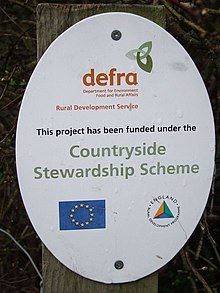Department for Environment, Food and Rural Affairs
 | |
| Department overview | |
|---|---|
| Formed | 2001 |
| Preceding agencies | |
| Jurisdiction | Government of the United Kingdom |
| Headquarters | 2 Marsham Street, London |
| Annual budget | £2.2 billion (current) & £400 million (capital) for 2011-12[1] |
| Secretary of State responsible | |
| Department executive |
|
| Child agencies | |
| Website | defra |
The Department for Environment, Food and Rural Affairs (Defra) is a ministerial department of the Government of the United Kingdom. It is responsible for environmental protection, food production and standards, agriculture, fisheries and rural communities in the entire United Kingdom. Concordats set out agreed frameworks for co operation, between it and the Scottish Government,[2] Welsh Government[3] and Northern Ireland Executive,[4] which have devolved responsibilities for these matters in their respective nations.
Defra also leads for the United Kingdom on agricultural, fisheries and environmental matters in international negotiations on sustainable development and climate change, although a new Department of Energy and Climate Change was created on 3 October 2008 to take over the last responsibility; later transferred to the Department for Business, Energy and Industrial Strategy following Theresa May's appointment as Prime Minister in July 2016.
Creation
The department was formed in June 2001, under the leadership of Margaret Beckett, when the Ministry of Agriculture, Fisheries and Food (MAFF) was merged with part of the Department of Environment, Transport and the Regions (DETR) and with a small part of the Home Office.
It was created after the perceived failure of MAFF to deal adequately with an outbreak of Foot and Mouth disease. The department had about 9,000 core personnel, as of January 2008[update].[5]
In October 2008, the climate team at Defra was merged with the energy team from the Department for Business Enterprise and Regulatory Reform (BERR), to create the Department of Energy and Climate Change, then headed by Ed Miliband.[6]
Ministers
Defra ministers are as follows, with cabinet members in bold:[7]
On 8 and 9 July 2024, the appointments of Daniel Zeichner as Minister of State[8] and Emma Hardy MP and [9] and Baroness Hayman of Ullock[10] as Parliamentary Under-Secretaries of State was announced, but without details of specific portfolios within Defra.
| Minister | Portrait | Office | Portfolio |
|---|---|---|---|
| The Rt Hon. Steve Reed MP | 
|
Secretary of State for Environment, Food and Rural Affairs | Strategy and overall responsibility for departmental policy; water quality and security; food production and security; economic growth; international relations; senior appointments. |
| Minister of State for Food, Farming and Fisheries | Farming; food; fisheries; agri-science and innovation; trade; lead for Rural Payments Agency (RPA), Agriculture and Horticulture Development Board (AHDB), Marine Management Organisation (MMO), Centre for Environment, Fisheries and Aquaculture Science (Cefas), and the Food and Environment Research Agency (FERA) | ||
| Minister of State for Climate, Environment and Energy | Held jointly with the FCDO. The Minister's Department for Environment, Food and Rural Affairs responsibilities include:
International nature and wildlife; oceans, domestic and international marine; green finance; Defra official development assistance (ODA) programme; lead for Royal Botanic Gardens, Kew. | ||
| Parliamentary Under Secretary of State for Nature | Floods; water; resources and waste; air quality and noise; environment regulation, including chemicals; lead for Environment Agency (EA) | ||
| Parliamentary Under-Secretary of State for Water and Rural Growth | Domestic natural environment, wildlife and land use; climate change adaptation; tree planting and forestry; landscapes, including National Parks and AONBs; access including rights of way and coastal paths; lead for Natural England, Forestry Commission and the Joint Nature Conservation Committee (JNCC) | ||
| Parliamentary Under-Secretary of State for Biosecurity, Animal Health and Welfare | Biosecurity and borders; Northern Ireland; animal welfare[11] |
The Permanent Secretary is Tamara Finkelstein, who replaced Clare Moriarty in 2019.[12][13]
Responsibilities
Defra is responsible for British Government policy in the following areas[14]
- Adaptation to global warming
- Agriculture
- Air quality
- Animal health and animal welfare
- Biodiversity
- Conservation
- Chemical substances and pesticides
- Fisheries
- Flooding
- Food
- Forestry
- Hunting
- Inland waterways
- Land management
- Marine policy
- National parks
- Noise
- Plant health
- Rural development
- Sustainable development
- Trade and the environment
- Waste management
- Water management
Some policies apply to England alone due to devolution, while others are not devolved and therefore apply to the United Kingdom as a whole.
Executive agencies
The department's executive agencies are:[15]
- Animal and Plant Health Agency (formerly the Animal Health and Veterinary Laboratories Agency, formed by a merger of Animal Health and the Veterinary Laboratories Agency,[16] and later parts of the Food and Environment Research Agency. Animal Health had launched on 2 April 2007 and was formerly the State Veterinary Service)[17]
- Centre for Environment, Fisheries and Aquaculture Science
- Rural Payments Agency
- Veterinary Medicines Directorate
Key delivery partners
The department's key delivery partners are:[18]
- Agriculture and Horticulture Development Board
- Consumer Council for Water
- Environment Agency
- Fera Science (formerly the Food and Environment Research Agency, now a company in which Defra holds a 25% stake)
- Forestry Commission (a non-ministerial government department including Forest Enterprise and Forest Research)
- Joint Nature Conservation Committee
- Marine Management Organisation (launched on 1 April 2010, incorporates the former Marine and Fisheries Agency)[19]
- National Forest Company
- Natural England (launched on 11 October 2006, formerly English Nature and elements of the Countryside Agency and the Rural Development Service)[20]
- Ofwat (a non-ministerial government department formally known as the Water Services Regulation Authority)
- Royal Botanic Gardens, Kew
- Sea Fish Industry Authority
A full list of departmental delivery and public bodies may be found on the Defra website.[21]
Defra in the English regions

Policies for environment, food and rural affairs are delivered in the regions by Defra's executive agencies and delivery bodies, in particular Natural England, the Rural Payments Agency, Animal Health and the Marine Management Organisation.
Defra provides grant aid to the following flood and coastal erosion risk management operating authorities:
Aim and strategic priorities
Defra's overarching aim is sustainable development, which is defined as "development which enables all people throughout the world to satisfy their basic needs and enjoy a better quality of life without compromising the quality of life of future generations." The Secretary of State wrote in a letter to the Prime Minister that he saw Defra's mission as enabling a move toward what the World Wide Fund for Nature (WWF) has called "one planet living".[22]
Under this overarching aim, Defra has five strategic priorities:[23]
- Climate change and energy.
- Sustainable consumption and production, including responsibility for the National Waste Strategy.
- Protecting the countryside and natural resource protection.
- Sustainable rural communities.
- A sustainable farming and food sector including animal health and welfare.
Defra Headquarters are at 2, Marsham Street, London.[24] It is also located at Nobel House, 17, Smith Square, London.[25]
See also
- Agriculture in the United Kingdom
- Air Quality Expert Group
- Badger culling in the United Kingdom
- Cattle Health Initiative
- Department of Agriculture and Rural Development (Northern Ireland)
- Energy policy in the United Kingdom
- Energy use and conservation in the United Kingdom
- Environmental contract
- List of atmospheric dispersion models
- National Bee Unit
- National Collection of Plant Pathogenic Bacteria
- New Technologies Demonstrator Programme
- Nicola Spence
- Scottish Executive Environment and Rural Affairs Department
- UK Dispersion Modelling Bureau
- United Kingdom budget
- Waste Implementation Programme
References
- ^ Budget 2011 (PDF). London: HM Treasury. 2011. p. 48. Archived from the original (PDF) on 1 August 2011. Retrieved 30 December 2011.
- ^ "Devolution - Main Concordat between the Ministry of Agriculture, Fisheries and Food and the Scottish Executive". Defra. 11 November 1999. Archived from the original on 18 March 2009.
- ^ "Concordat between MAFF and the Cabinet of the National Assembly for Wales". Defra. 24 October 2000. Archived from the original on 23 February 2006.
- ^ "Devolution: Subject specific Concordat between MAFF and the Scottish Executive on fisheries". Defra. 11 November 1999. Archived from the original on 20 November 2008.
- ^ "Defra departmental report" (PDF). Archived from the original (PDF) on 27 June 2008.[dead link]
- ^ Harrabin, Roger (3 October 2008). "Marrying energy demand and supply". BBC News. Retrieved 22 May 2009.
- ^
 This article incorporates text published under the British Open Government Licence: "Our ministers". GOV.UK. Department for Environment, Food and Rural Affairs. Retrieved 14 October 2022.
This article incorporates text published under the British Open Government Licence: "Our ministers". GOV.UK. Department for Environment, Food and Rural Affairs. Retrieved 14 October 2022.
- ^ Daniel Zeichner MP
- ^ Emma Hardy MP
- ^ Baroness Hayman of Ullock
- ^ "Parliamentary Under Secretary of State (Minister for Biosecurity, Animal Health and Welfare) - GOV.UK". www.gov.uk. Retrieved 7 December 2023.
- ^ [1], Defra
- ^ "Appointment of new Permanent Secretary at Defra". GOV.UK. 19 June 2019. Retrieved 21 June 2019.
- ^ "Cabinet Office List of Ministerial Responsibilities, July 2010". Cabinetoffice.gov.uk. 16 September 2010. Retrieved 18 November 2011.
- ^ "List of ministerial responsibilities (including Executive Agencies and Non-Ministerial Departments)" (PDF). Retrieved 18 November 2011.
- ^ "DEFRA Agencies shake-up", news release by Defra, 29 June 2010 (from the Defra website)
- ^ "Launch of Animal Health" Archived 22 April 2007 at the Wayback Machine, news release by Animal Health, 2 April 2007 (from the Defra website)
- ^ "Working with others: Defra's delivery partners" Archived 5 February 2007 at the Wayback Machine, Chapter 6, Departmental Report 2006 (from the Defra website)
- ^ "Marine Management Organisation established" Archived 2 April 2010 at the Wayback Machine, press release by Defra, 1 April 2010 (from the Defra website.
- ^ "New champion for the environment launches". Natural England. 11 October 2006. Archived from the original on 10 June 2007.
- ^ "Delivery Landscape Map". Defra. 20 April 2007. Archived from the original on 29 April 2007.
- ^ Miliband, David (11 July 2006). "My priorities for Defra" (PDF). Archived from the original (PDF) on 10 June 2007.
- ^ "Delivering the Essentials of Life: Defra's Five Year Strategy" (PDF). Defra. December 2004. "Annex B". Archived from the original (PDF) on 6 February 2007.
- ^ "Defra staff set for Marsham Street move as leases expire". Civil Service World. 24 June 2020.
- ^ "London Nobel House DEPARTMENT FOR ENVIRONMENT, FOOD AND RURAL AFFAIRS". governmentbuildings.co.uk.
External links
- Defra's official website
- Fera - Executive agency of DEFRA
- National Collection of Plant Pathogenic Bacteria - Fera
- English Nature's website
- JNCC's website
- Defra's wiki for formulating an environmental contract
- Air Quality Expert Group Archived 6 December 2019 at the Wayback Machine
Video clips
- Department for Environment, Food and Rural Affairs
- Ministerial departments of the Government of the United Kingdom
- Agricultural organisations based in England
- Environment ministries
- Environment of England
- Ministries established in 2001
- 2001 establishments in the United Kingdom
- Forestry agencies in the United Kingdom
- Agriculture ministries
